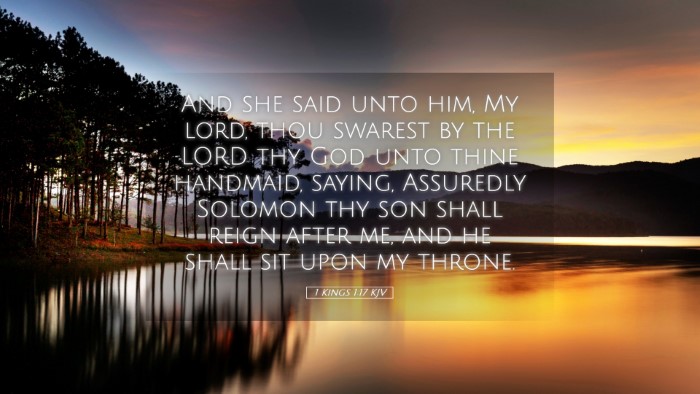Commentary on 1 Kings 1:17
Verse: "And she said unto him, My lord, thou swarest by the LORD thy God unto thy handmaid, saying, Assuredly Solomon thy son shall reign after me, and he shall sit upon my throne."
Introduction
The narrative surrounding 1 Kings 1:17 sets the stage for a significant transition in the Davidic monarchy. The verse captures Bathsheba's appeal to King David, invoking his previous oath regarding the succession of Solomon. This moment is crucial for understanding the themes of authority, divine promise, and human agency that run throughout the biblical text.
Historical Context
As noted in both Matthew Henry's Commentary and Albert Barnes' Notes, this passage is set against the backdrop of a power struggle following King David's advanced age and declining health. Adonijah, one of David's sons, has declared himself king, which sets in motion a series of events leading to a formal recognition of Solomon as king. Bathsheba's role here reflects the potential influence of royal women in ancient Israelite society.
Key Themes
-
Divine Promise: The promise made by David to Bathsheba is not merely a political pledge but is seen as part of God's covenantal plan. Adam Clarke emphasizes that God's promises often unfold through human actors, highlighting the interplay between divine sovereignty and human actions.
-
Intercession and Advocacy: Bathsheba's assertion of David's promise illustrates the theme of intercession. She represents a voice seeking to uphold the divine intention for Solomon's kingship. This role invites reflection on the importance of prayer and advocacy for God’s purposes in human affairs.
-
Authority and Succession: The conflict surrounding the throne underscores issues of authority and governance. As indicated by Barnes, the legitimacy of leadership is pivotal in biblical narrative, encouraging a consideration of how divine appointment affects human governance.
Commentary Insights
Bible Exposition
According to Matthew Henry, Bathsheba’s reminder to David serves as a necessary catalyst for action. David's prior oath binds him to honor the divine choice of Solomon as king. The interaction signifies the critical nature of remembering God’s promises and acting upon them, particularly in leadership contexts.
The Role of Women
Bathsheba's involvement in this royal episode is noteworthy. Adam Clarke observes that her persistence signifies that women in the biblical narrative often exert influence, albeit within the limitations of their cultural contexts. This raises essential questions about gender roles in leadership, advocacy, and the fulfillment of God’s purposes.
The Importance of Oaths
The function of oaths in the ancient Near Eastern context cannot be overstated. Barnes elucidates that oaths not only confirm personal integrity but also bind leaders to their commitments. David's oath to Bathsheba reinforces the idea that leaders are held to a higher standard, being accountable to both God and the people they lead.
Theological Reflections
This verse encourages a deeper reflection on God's faithfulness and the ways in which He works through human decisions and vows. As seen in the passage, God's promises are intertwined with human actions, calling believers to trust in His sovereignty while actively participating in His plans.
Application for Today
The themes present in 1 Kings 1:17 offer meaningful applications for pastors, students, and theologians:
- The Reminder of God’s Promises: Believers today are called to remember and hold fast to God's promises, just as Bathsheba reminded David. This serves as a vital part of faith and leadership.
- The Role of Intercession: Engaging in intercessory prayer for leaders and the church’s direction reflects Bathsheba's example and stresses the importance of advocating for God's will.
- Leadership and Accountability: Understanding the weight of oaths and commitments in leadership challenges contemporary leaders to lead with integrity and faithfulness, reflecting God’s character.
Conclusion
1 Kings 1:17 is not merely a historical account but a rich narrative illustrating the interplay of divine promise, human agency, and the complexities of leadership. The insights from Matthew Henry, Albert Barnes, and Adam Clarke enhance our understanding of this pivotal moment in biblical history. As we engage with this text, we are encouraged to reflect on our commitments and to actively participate in God’s unfolding plan with confidence and integrity.


